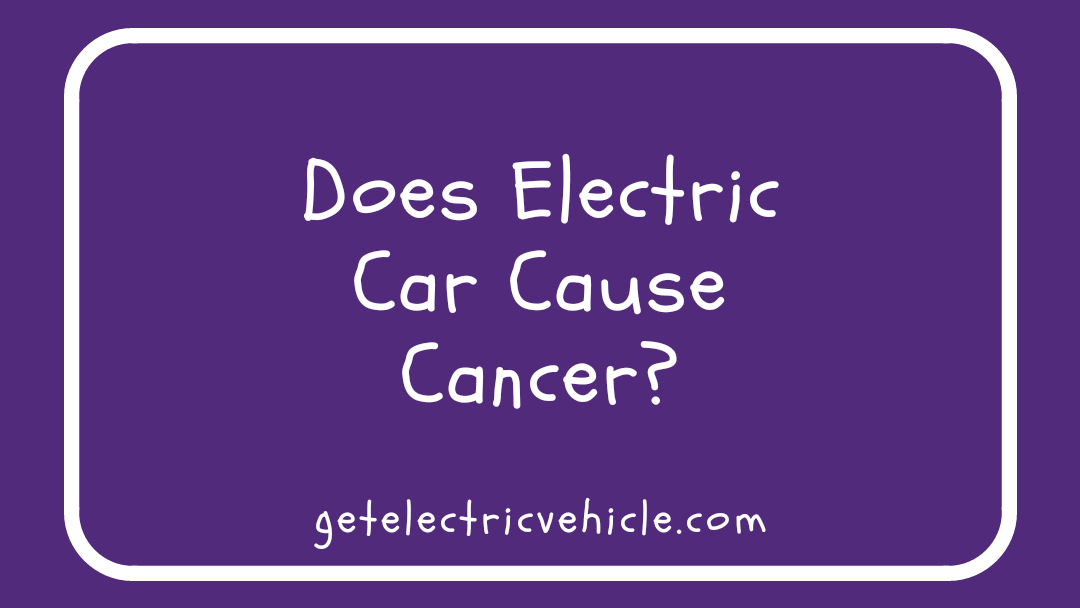
Do electric cars cause cancer? Many asked the question since EVs started to be manufactured widely. The main reason is that the curiosity about how the zero-emission vehicle minimizes the possibility of cancer and other diseases caused by an internal combustion engine vehicle.
An electric vehicle uses one or more electric motors for propulsion. Conventional vehicles use an internal combustion engine to burn fuel and propel the vehicle. As a result of the increased air pollution and fossil fuel depletion, electric vehicles replace conventional IC engine vehicles.
Even though conventional vehicles dominate the automotive market, electric vehicles do have a prominent future.

Let’s check if a vehicle causes cancer
- During manufacturing
- During operation
- During recycling
Our main focus would be the possibility of cancer during operation, and the recycling of a vehicle.
Before answering the question do electric cars cause cancer, let’s check the possible reasons of cancer from a vehicle.
“Cancer is the name given to a collection of related diseases. In all types of cancer, some of the body’s cells begin to divide without stopping and spread into surrounding tissues” – National Cancer Institute
Air pollution and cancer
How does air pollution causes cancer? One of the main sources of air pollution is the exhaust from internal combustion engine vehicles.
A diesel car emits around 40 air polluting components when it is operated. Each component is assigned with a cancer potency level based on the known carcinogen Benzene. 1,3 Butadiene has 20 times more carcinogenic than Benzene according to Swedish standards. US EPA (United Nations Environmental Protection Agency) considers it 36 times more dangerous.
Electromagnetic radiation and cancer
Electromagnetic fields are generally classified as
- Low-Mid frequency EMF
- High-frequency EMF
Low – Mid frequency EMF: Magnetic fields from power transmission lines, radio waves, infra-red, visible light, etc. comes in this category. These are non-ionizing radiations don’t damage DNA or cells directly.
High-frequency EMF: X-rays and gamma rays are included in this category and they are ionizing radiation which can damage DNA or cells directly.
The good news is that there is no evidence for Low-Mid frequency EMF results in cancer!
Some scientists speculated that non-ionizing EMFs causes cancer through other mechanisms (reduction of hormones – melatonin).
National Institute of cancer says how electromagnetic fields and cancer are related.
Do electric cars cause cancer when they work?
Is there any possibility of cancer from an electric vehicle? Considering the polluted air and electromagnetic radiation, we can summarise the chances of cancer as given below.
#1 From polluted air
An electric car (battery electric vehicle) doesn’t have a tail pipe and it’s a zero emission vehicle.
So the possibility of cancer due to air pollution when vehicle runs are avoided in an electric vehicle.
Hybrid electric vehicle and plug-in hybrid electric vehicle have tailpipe emission and they are not zero polluting vehicles. but the quantity of gases emitted is much less in a hybrid vehicle than a conventional vehicle.
#2 From Electromagnetic radiations
Modern Electric vehicles, conventional cars, and other automobiles incorporate many Electro Magnetic Field emitting devices. Sensors and Radars emit electromagnetic radiations inside a car.
“Cars in effect will be micro-wave ovens on wheels” – Dr. Theodore P. Metsis
With V2V and V2I connectivity, further increases the radiation inside the vehicle.
The main components results EMF in a car are
- ABS brakes
- Blue tooth
- WiFi
- Antennas of connected vehicles
You may have a look at the picture below to know more

As we discussed in the above section, the possibility of cancer from low-frequency radiations are less.
Do IC engine vehicle cause cancer?
Exposure to the air that polluted from vehicles results in cancer. As we discussed above, the internal combustion engine emits a large number of air polluting substances. Diesel engines are more dangerous than petrol engines. Air pollution results in lung cancer and other respiratory diseases.
Do vehicles cause cancer when they are manufactured?
Manufacturing process of a car emits harmful pollutants to the atmosphere. Lead is the main component of a battery which may cause kidney, brain, and lunch cancer.
A population-based case control study in southeastern Michigan by R. W. Kobrosly, J. R. Meliker, and J. O. Nriagu shows that a higher risk of bladder cancer for those who worked for 20 or more years on the assembly line.
The risks are almost equal in both the IC engine and electric vehicle manufacturing industries.
Why Electric Vehicle?
Considering all the adverse effects of pollution from an IC engine vehicle, we would prefer an electric vehicle for transportation. An electric vehicle doesn’t have tailpipe emissions. If electricity is generated from renewable sources of energy such as solar, wind, the overall pollution from the vehicle can be further reduced.
World’s major vehicle manufacturers declared their electric vehicle policies.
- Top electric car manufactures you should consider when going for an EV
- Is the future of EV prominent?
Conclusion
An electric vehicle does not result in as much pollution as an IC engine vehicle. If only the operation of the vehicle is taken into account, the electric vehicle does not pollute the air. Low-frequency electromagnetic radiation does not cause cancer as high-frequency ionizing electromagnetic fields do.
So Electric Cars are safer than IC engine vehicles (less chance of cancer) !
Don’t forget to share the post with your friends and follow us on Facebook, LinkedIn, Twitter, Instagram, and YouTube!
Key points
- Internal Combustion Engine vehicle emits harmful gases to the environment
- Battery electric vehicle emits no gas
- Electromagnetic field from EVs and other cars are non-ionizing and may not cause cancer